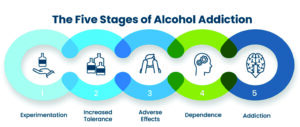Alcohol addiction, clinically referred to as Alcohol Use Disorder (AUD), is a prevalent and complex issue that plagues individuals worldwide. It is a disease that affects people of all walks of life. Experts have tried to pinpoint factors like genetics, sex, race, or socioeconomics that may predispose someone to alcohol addiction. But it has no single cause. Psychological, genetic, and behavioural factors can all contribute to having the disease.
It’s important to note that alcoholism is a real disease which causes changes to the brain and neurochemistry. A person with an alcohol addiction may not be able to control their actions. Alcohol addiction can show itself in a variety of ways. The severity of the disease, how often someone drinks, and the alcohol they consume varies from person to person. Some people drink heavily all day, while others binge drink and then stay sober for a while. Regardless of how the addict ion looks, someone typically has an alcohol addiction if they heavily rely on drinking and can’t stay sober for an extended period of time.
ion looks, someone typically has an alcohol addiction if they heavily rely on drinking and can’t stay sober for an extended period of time.
What is considered ‘1 drink’?
The National Institute on Alcohol Abuse and Alcoholism (USA) defines one standard drink as any one of these:
- 12 ounces (355 millilitres) of regular beer (about 5% alcohol)
- 8 to 9 ounces (237 to 266 millilitres) of malt liquor (about 7% alcohol)
- 5 ounces (148 millilitres) of wine (about 12% alcohol)
- 5 ounces (44 millilitres) of hard liquor or distilled spirits (about 40% alcohol)
CAUSES OF ALCOHOL ADDICTION:
Genetic Factors: Genetic predisposition can play a significant role in alcohol addiction. If a person has a family history of alcoholism, their risk of developing AUD is higher.
Environmental Factors: The environment in which a person grows up or lives can strongly influence alcohol addiction. Factors such as easy access to alcohol, social acceptance of heavy drinking, and peer pressure can contribute to alcoholism.
Psychological Factors: Individuals with mental health issues like anxiety, depression, or trauma may turn to alcohol as a coping mechanism. The temporary relief that alcohol provides can lead to dependency.
Neurochemical Factors: Alcohol alters brain chemistry. It affects neurotransmitters, leading to changes in mood and behaviour. As the brain adapts to the presence of alcohol, cravings and dependency can develop.
SYMPTOMS OF ALCOHOL ADDICTION:
Recognizing the signs of alcohol addiction is crucial for early intervention. Some common symptoms include:
Increased Tolerance: The need to consume more alcohol to achieve the desired effect.
Loss of Control: Inability to limit the amount of alcohol consumed.
Withdrawal Symptoms: Experiencing physical and psychological discomfort when not drinking, leading to increased alcohol consumption.
Neglecting Responsibilities: Prioritizing alcohol over work, family, or other commitments.
Failed Attempts to Quit: Repeatedly trying to stop drinking or cut down but being unsuccessful.
COMPLICATIONS OF ALCOHOL ADDICTION:
Alcohol addiction can lead to severe health and social problems, including:
Liver Damage: Conditions like cirrhosis and fatty liver disease are common among heavy drinkers.
Heart Issues: High blood pressure, irregular heartbeat, and cardiomyopathy (weakening of the heart muscle) can result from chronic alcohol use.
Mental Health Disorders: An increased risk of depression, anxiety, and even psychosis is associated with AUD.
Relationship and Social Problems: Isolation, conflicts with loved ones, and legal issues can arise due to alcohol addiction.
Cognitive Impairment: Memory problems, reduced concentration, and impaired decision-making are common.
HOW ALCOHOL AFFECTS THE BRAIN:
Alcohol exerts a profound impact on brain function. Initially, it may produce feelings of relaxation and euphoria, but continued use can lead to:
Impaired Judgment and Decision-Making: Alcohol impairs the brain’s ability to make sound decisions, often leading to risky behaviours.
Reduced Inhibitions: Individuals under the influence of alcohol may engage in behaviors they would not when sober.
Memory Related Problems: Alcohol impairs short-term and long-term memory formation.
Motor Skills Impairment: Coordination and motor skills deteriorate, increasing the risk of accidents.
Neurotransmitter Imbalance: Chronic alcohol use disrupts neurotransmitter balance, leading to cravings and reinforcing the addiction cycle.
PREVENTION
To prevent alcohol use disorder, avoid high-risk drinking- the general rule of thumb is:
For women: No more than four or more drinks in one day or eight or more drinks per week.
For men: No more than five or more drinks in one day or 15 or more drinks per week.
If you drink more alcohol than that, consider cutting back or quitting. Talk to your healthcare provider about proven strategies.
If you feel that you sometimes drink too much alcohol, or your drinking is causing problems, or if your family is concerned about your drinking, that is a red flag. With alcohol consumption, denial is common, you may feel like you don’t have a problem with drinking. You might not recognize how much you drink or how many problems in your life are related to alcohol use. It is important to listen to relatives, friends or co-workers when they ask you to examine your drinking habits or to seek help.
DIAGNOSING ALCOHOL USE DISORDER:
There’s no single lab test for alcohol use disorder. Diagnosis is based on a conversation with your healthcare provider. The diagnosis is made when drinking interferes with your life or affects your health.
Treatment Options:
Recovery from alcohol addiction is possible with appropriate treatment and support. Treatment options include:
Detoxification: The first step involves safely removing alcohol from the body. This is often done under medical supervision to manage withdrawal symptoms.
Behavioural Therapies: Therapeutic approaches like Cognitive-Behavioral Therapy (CBT) and Motivational Enhancement Therapy (MET) help individuals change their drinking behaviours and address underlying issues.
Medications: Certain medications can be prescribed to manage cravings and reduce the risk of relapse.
Support Groups: Participation in programs like Alcoholics Anonymous (AA) or SMART Recovery provides a supportive community and structured approach to recovery.
Rehabilitation Programs: Inpatient or outpatient rehabilitation programs offer comprehensive treatment, including counselling, therapy, and education on relapse prevention.
Alcohol addiction is a pervasive and treatable condition that affects individuals, families, and communities. Understanding its causes, recognizing the symptoms, and seeking help are essential steps in addressing this issue. With the right treatment and support, individuals can embark on a path to recovery, leading to a healthier and more fulfilling life free from the grip of alcohol addiction.
[This article is for information purposes only and is NOT a substitute for actual treatment or mental health care.]
- Understanding Attachment Styles And Their Impact on Relationships - 27 April2024
- Managing Relationship Stress - 13 April2024
- Prioritizing Mental Health: A Year-Round Commitment - 16 March2024
